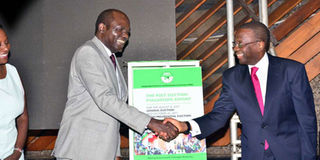2017 election: IEBC shopping for expert to audit its systems

Independent Elections and Boundaries Commission Chairman Wafula Chebukati (left) shakes hands with former Chief Justice, Dr Willy Mutunga, during the launch of the "Post-Election Evaluation Report for the 2017 General and Fresh Presidential Elections" at the KICC Tsavo ballroom on February 12, 2019. PHOTO | FRANCIS NDERITU | NATION MEDIA GROUP
What you need to know:
The ODM leader also alleged that results from some of the polling stations were relayed from ungazetted areas, and that the system was configured to maintain an 11 per cent margin between him and Mr Kenyatta.
He described President Kenyatta and his Deputy, Mr William Ruto, as computer-generated leaders, a remark described by the President in his affidavit as demeaning.
IEBC Chairman Wafula Chebukati says the commission is shopping for an external consultant to audit its data systems to finally reveal what might have happened during the transmission of results in the August 2017 Presidential Election that was nullified by the Supreme Court.
Broaching the topic for the first time nearly one-and-half years later, Mr Chebukati said results of the audit will be made public.
CONSULTANT
“It is not true that we refused to open the servers,” he said, in reference to a Supreme Court order the commission violated. “What we need is an external consultant to carry out a systems audit and then open the servers to the public.”
He was speaking during the launch of the Post-Election Evaluation Report for the August 8, 2017 General Election and October 26, 2017 repeat presidential election at the Kenyatta International Convention Centre in Nairobi on Monday.
But he pointed out that getting a consultant comes with costs.
“We need money to hire an external consultant and the National Treasury must provide the money. Without money, there is no way this work will be done,” he said, without indicating how much it would cost.
He urged the National Treasury and the National Assembly to work together to ensure that the funds are allocated in the 2019/2020 financial year.
Mr Chebukati said the commission is ready to sit down with Parliament to discuss its budget and pleaded that the allocation for the systems audit not be expunged should funds be made available.
“If the National Treasury provides the funds, you should not re-allocate the funds when it comes to adopting the budget,” he said, in remarks directed at Mr William Cheptumo, the Chairman of the Justice Committee of the National Assembly, who was present.
CREDIBILITY
“Don’t remove this budget item when the full budget comes for adoption in the House.”
Accessing the commission’s servers has been a sensitive issue since the Supreme Court allowed Mr Raila Odinga to access the system during the presidential petition he filed after IEBC declared Mr Uhuru Kenyatta the winner of the August 8, 2017 election.
In a unanimous decision, the seven judges told the commission to open the servers because understanding how the system works would help the court come to a fair decision.
Mr Odinga had alleged that data entered into the system from more than 11,000 polling stations was not consistent with the information in the respective Forms 34A.
He argued that an unauthorised person illegally accessed the servers, altered figures and made a number of deletions, which compromised the credibility of the August 8 poll.
The ODM leader also alleged that results from some of the polling stations were relayed from ungazetted areas, and that the system was configured to maintain an 11 per cent margin between him and Mr Kenyatta.
SAFEGUARDS
He described President Kenyatta and his Deputy, Mr William Ruto, as computer-generated leaders, a remark described by the President in his affidavit as demeaning.
However, the IEBC refused to open the servers, with its lawyer Paul Muite telling the court that the delay in opening the system was attributable to the time difference between Europe and Kenya.
“The IEBC servers are hosted in France, and the staff who are supposed to give the access window with safeguards are just waking up and will prepare the system in about an hour for the Nasa team to access,” Mr Muite told the court.
But the servers were never opened.




